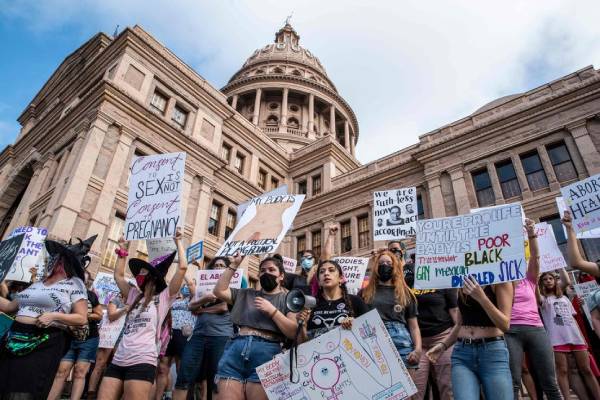A federal court in Texas has temporarily halted a new restriction on most abortions in Texas, delivering the Biden administration a key early success in its fight to repeal the nation’s toughest abortion legislation.
The judgment by U.S. District Judge Robert Pitman in Austin on Wednesday means that, for the time being, medical practitioners in Texas can give abortions beyond roughly six weeks of pregnancy without fear of being sued by members of the public.
Texas is expected to appeal the decision, and federal appeals courts often stay injunctions. The injunction, and maybe the statute itself, may be decided by the United States Supreme Court.
The Justice Department claimed that the legislation should be placed on hold while the lawsuit is being resolved since it is already having a significant impact on women, compelling them to travel hundreds or thousands of miles for reproductive care if they have the time and money to do so.
Other Republican-led states have been keeping a close eye on the case because they see it as a model for restricting abortions while avoiding federal legal challenges. Conservatives throughout the country are rushing to limit the process while also attempting to undermine or invalidate the 1973 Supreme Court judgment in Roe v. Wade, which ensures access to abortion.
The law, which took effect Sept. 1, prohibits abortions before most women know they’re pregnant and has no exceptions for rape or incest. Texas lawmakers, like those in many other Republican-led states, say it’s needed to protect life once the first signs of cardiac activity are detected in the fetus.
The novel statute also aims to avoid lawsuits against the state by outsourcing enforcement to private citizens, empowering them to sue doctors or anyone else suspected of violating the ban and to seek bounties of at least $10,000 per illegal procedure.
The judge said an injunction is warranted because the U.S. is well poised to win the case on the merits.
During the hearing, Justice Department lawyer Brian Netter stated that the law was enacted to protect children “avoid a legal challenge to the ban’s legality, calling it “aggressive and scary” and a “open threat to the rule of law.” Despite the fact that this case is about abortion, he stated that “Other legislation,” worded in a similar manner, may chill other fundamental rights, such as freedom of expression, it’s not difficult to conceive.
The injunction, the first major setback for Texas in its defense of the law, will apply to private citizens who could file lawsuits as well as to state court judges who would hear such cases. Texas had argued it would be unfair to issue an injunction against people who couldn’t be heard in the case and that the U.S. has no authority to sue the state.
The Supreme Court has already signaled deference to the Texas law. The court stunned pro-choice activists and civil rights groups when it allowed the ban to take effect in a 5-4 decision in a different suit, brought by Texas abortion providers.
During the hearing, Justice Department lawyer Brian Netter stated that the law was enacted to protect children “avoid a legal challenge to the ban’s legality, calling it “aggressive and scary” and a “open threat to the rule of law.” Despite the fact that this case is about abortion, he stated that “Other legislation,” worded in a similar manner, may chill other fundamental rights, such as freedom of expression, it’s not difficult to conceive.
A federal court in Texas has temporarily halted a new restriction on most abortions in Texas, delivering the Biden administration a key early success in its fight to repeal the nation’s toughest abortion legislation.
The judgment by U.S. District Judge Robert Pitman in Austin on Wednesday means that, for the time being, medical practitioners in Texas can give abortions beyond roughly six weeks of pregnancy without fear of being sued by members of the public.
Texas is expected to appeal the decision, and federal appeals courts often stay injunctions. The injunction, and maybe the statute itself, may be decided by the United States Supreme Court.
The Justice Department claimed that the legislation should be placed on hold while the lawsuit is being resolved since it is already having a significant impact on women, compelling them to travel hundreds or thousands of miles for reproductive care if they have the time and money to do so.
Other Republican-led states have been keeping a close eye on the case because they see it as a model for restricting abortions while avoiding federal legal challenges. Conservatives throughout the country are rushing to limit the process while also attempting to undermine or invalidate the 1973 Supreme Court judgment in Roe v. Wade, which ensures access to abortion.
The law, which took effect Sept. 1, prohibits abortions before most women know they’re pregnant and has no exceptions for rape or incest. Texas lawmakers, like those in many other Republican-led states, say it’s needed to protect life once the first signs of cardiac activity are detected in the fetus.
The novel statute also aims to avoid lawsuits against the state by outsourcing enforcement to private citizens, empowering them to sue doctors or anyone else suspected of violating the ban and to seek bounties of at least $10,000 per illegal procedure.
The judge said an injunction is warranted because the U.S. is well poised to win the case on the merits.
During the hearing, Justice Department lawyer Brian Netter stated that the law was enacted to protect children “avoid a legal challenge to the ban’s legality, calling it “aggressive and scary” and a “open threat to the rule of law.” Despite the fact that this case is about abortion, he stated that “Other legislation,” worded in a similar manner, may chill other fundamental rights, such as freedom of expression, it’s not difficult to conceive.
The injunction, the first major setback for Texas in its defense of the law, will apply to private citizens who could file lawsuits as well as to state court judges who would hear such cases. Texas had argued it would be unfair to issue an injunction against people who couldn’t be heard in the case and that the U.S. has no authority to sue the state.
The Supreme Court has already signaled deference to the Texas law. The court stunned pro-choice activists and civil rights groups when it allowed the ban to take effect in a 5-4 decision in a different suit, brought by Texas abortion providers.
During the hearing, Justice Department lawyer Brian Netter stated that the law was enacted to protect children “avoid a legal challenge to the ban’s legality, calling it “aggressive and scary” and a “open threat to the rule of law.” Despite the fact that this case is about abortion, he stated that “Other legislation,” worded in a similar manner, may chill other fundamental rights, such as freedom of expression, it’s not difficult to conceive.
A federal court in Texas has temporarily halted a new restriction on most abortions in Texas, delivering the Biden administration a key early success in its fight to repeal the nation’s toughest abortion legislation.
The judgment by U.S. District Judge Robert Pitman in Austin on Wednesday means that, for the time being, medical practitioners in Texas can give abortions beyond roughly six weeks of pregnancy without fear of being sued by members of the public.
Texas is expected to appeal the decision, and federal appeals courts often stay injunctions. The injunction, and maybe the statute itself, may be decided by the United States Supreme Court.
The Justice Department claimed that the legislation should be placed on hold while the lawsuit is being resolved since it is already having a significant impact on women, compelling them to travel hundreds or thousands of miles for reproductive care if they have the time and money to do so.
Other Republican-led states have been keeping a close eye on the case because they see it as a model for restricting abortions while avoiding federal legal challenges. Conservatives throughout the country are rushing to limit the process while also attempting to undermine or invalidate the 1973 Supreme Court judgment in Roe v. Wade, which ensures access to abortion.
The law, which took effect Sept. 1, prohibits abortions before most women know they’re pregnant and has no exceptions for rape or incest. Texas lawmakers, like those in many other Republican-led states, say it’s needed to protect life once the first signs of cardiac activity are detected in the fetus.
The novel statute also aims to avoid lawsuits against the state by outsourcing enforcement to private citizens, empowering them to sue doctors or anyone else suspected of violating the ban and to seek bounties of at least $10,000 per illegal procedure.
The judge said an injunction is warranted because the U.S. is well poised to win the case on the merits.
During the hearing, Justice Department lawyer Brian Netter stated that the law was enacted to protect children “avoid a legal challenge to the ban’s legality, calling it “aggressive and scary” and a “open threat to the rule of law.” Despite the fact that this case is about abortion, he stated that “Other legislation,” worded in a similar manner, may chill other fundamental rights, such as freedom of expression, it’s not difficult to conceive.
The injunction, the first major setback for Texas in its defense of the law, will apply to private citizens who could file lawsuits as well as to state court judges who would hear such cases. Texas had argued it would be unfair to issue an injunction against people who couldn’t be heard in the case and that the U.S. has no authority to sue the state.
The Supreme Court has already signaled deference to the Texas law. The court stunned pro-choice activists and civil rights groups when it allowed the ban to take effect in a 5-4 decision in a different suit, brought by Texas abortion providers.
During the hearing, Justice Department lawyer Brian Netter stated that the law was enacted to protect children “avoid a legal challenge to the ban’s legality, calling it “aggressive and scary” and a “open threat to the rule of law.” Despite the fact that this case is about abortion, he stated that “Other legislation,” worded in a similar manner, may chill other fundamental rights, such as freedom of expression, it’s not difficult to conceive.
A federal court in Texas has temporarily halted a new restriction on most abortions in Texas, delivering the Biden administration a key early success in its fight to repeal the nation’s toughest abortion legislation.
The judgment by U.S. District Judge Robert Pitman in Austin on Wednesday means that, for the time being, medical practitioners in Texas can give abortions beyond roughly six weeks of pregnancy without fear of being sued by members of the public.
Texas is expected to appeal the decision, and federal appeals courts often stay injunctions. The injunction, and maybe the statute itself, may be decided by the United States Supreme Court.
The Justice Department claimed that the legislation should be placed on hold while the lawsuit is being resolved since it is already having a significant impact on women, compelling them to travel hundreds or thousands of miles for reproductive care if they have the time and money to do so.
Other Republican-led states have been keeping a close eye on the case because they see it as a model for restricting abortions while avoiding federal legal challenges. Conservatives throughout the country are rushing to limit the process while also attempting to undermine or invalidate the 1973 Supreme Court judgment in Roe v. Wade, which ensures access to abortion.
The law, which took effect Sept. 1, prohibits abortions before most women know they’re pregnant and has no exceptions for rape or incest. Texas lawmakers, like those in many other Republican-led states, say it’s needed to protect life once the first signs of cardiac activity are detected in the fetus.
The novel statute also aims to avoid lawsuits against the state by outsourcing enforcement to private citizens, empowering them to sue doctors or anyone else suspected of violating the ban and to seek bounties of at least $10,000 per illegal procedure.
The judge said an injunction is warranted because the U.S. is well poised to win the case on the merits.
During the hearing, Justice Department lawyer Brian Netter stated that the law was enacted to protect children “avoid a legal challenge to the ban’s legality, calling it “aggressive and scary” and a “open threat to the rule of law.” Despite the fact that this case is about abortion, he stated that “Other legislation,” worded in a similar manner, may chill other fundamental rights, such as freedom of expression, it’s not difficult to conceive.
The injunction, the first major setback for Texas in its defense of the law, will apply to private citizens who could file lawsuits as well as to state court judges who would hear such cases. Texas had argued it would be unfair to issue an injunction against people who couldn’t be heard in the case and that the U.S. has no authority to sue the state.
The Supreme Court has already signaled deference to the Texas law. The court stunned pro-choice activists and civil rights groups when it allowed the ban to take effect in a 5-4 decision in a different suit, brought by Texas abortion providers.
During the hearing, Justice Department lawyer Brian Netter stated that the law was enacted to protect children “avoid a legal challenge to the ban’s legality, calling it “aggressive and scary” and a “open threat to the rule of law.” Despite the fact that this case is about abortion, he stated that “Other legislation,” worded in a similar manner, may chill other fundamental rights, such as freedom of expression, it’s not difficult to conceive.
A federal court in Texas has temporarily halted a new restriction on most abortions in Texas, delivering the Biden administration a key early success in its fight to repeal the nation’s toughest abortion legislation.
The judgment by U.S. District Judge Robert Pitman in Austin on Wednesday means that, for the time being, medical practitioners in Texas can give abortions beyond roughly six weeks of pregnancy without fear of being sued by members of the public.
Texas is expected to appeal the decision, and federal appeals courts often stay injunctions. The injunction, and maybe the statute itself, may be decided by the United States Supreme Court.
The Justice Department claimed that the legislation should be placed on hold while the lawsuit is being resolved since it is already having a significant impact on women, compelling them to travel hundreds or thousands of miles for reproductive care if they have the time and money to do so.
Other Republican-led states have been keeping a close eye on the case because they see it as a model for restricting abortions while avoiding federal legal challenges. Conservatives throughout the country are rushing to limit the process while also attempting to undermine or invalidate the 1973 Supreme Court judgment in Roe v. Wade, which ensures access to abortion.
The law, which took effect Sept. 1, prohibits abortions before most women know they’re pregnant and has no exceptions for rape or incest. Texas lawmakers, like those in many other Republican-led states, say it’s needed to protect life once the first signs of cardiac activity are detected in the fetus.
The novel statute also aims to avoid lawsuits against the state by outsourcing enforcement to private citizens, empowering them to sue doctors or anyone else suspected of violating the ban and to seek bounties of at least $10,000 per illegal procedure.
The judge said an injunction is warranted because the U.S. is well poised to win the case on the merits.
During the hearing, Justice Department lawyer Brian Netter stated that the law was enacted to protect children “avoid a legal challenge to the ban’s legality, calling it “aggressive and scary” and a “open threat to the rule of law.” Despite the fact that this case is about abortion, he stated that “Other legislation,” worded in a similar manner, may chill other fundamental rights, such as freedom of expression, it’s not difficult to conceive.
The injunction, the first major setback for Texas in its defense of the law, will apply to private citizens who could file lawsuits as well as to state court judges who would hear such cases. Texas had argued it would be unfair to issue an injunction against people who couldn’t be heard in the case and that the U.S. has no authority to sue the state.
The Supreme Court has already signaled deference to the Texas law. The court stunned pro-choice activists and civil rights groups when it allowed the ban to take effect in a 5-4 decision in a different suit, brought by Texas abortion providers.
During the hearing, Justice Department lawyer Brian Netter stated that the law was enacted to protect children “avoid a legal challenge to the ban’s legality, calling it “aggressive and scary” and a “open threat to the rule of law.” Despite the fact that this case is about abortion, he stated that “Other legislation,” worded in a similar manner, may chill other fundamental rights, such as freedom of expression, it’s not difficult to conceive.
A federal court in Texas has temporarily halted a new restriction on most abortions in Texas, delivering the Biden administration a key early success in its fight to repeal the nation’s toughest abortion legislation.
The judgment by U.S. District Judge Robert Pitman in Austin on Wednesday means that, for the time being, medical practitioners in Texas can give abortions beyond roughly six weeks of pregnancy without fear of being sued by members of the public.
Texas is expected to appeal the decision, and federal appeals courts often stay injunctions. The injunction, and maybe the statute itself, may be decided by the United States Supreme Court.
The Justice Department claimed that the legislation should be placed on hold while the lawsuit is being resolved since it is already having a significant impact on women, compelling them to travel hundreds or thousands of miles for reproductive care if they have the time and money to do so.
Other Republican-led states have been keeping a close eye on the case because they see it as a model for restricting abortions while avoiding federal legal challenges. Conservatives throughout the country are rushing to limit the process while also attempting to undermine or invalidate the 1973 Supreme Court judgment in Roe v. Wade, which ensures access to abortion.
The law, which took effect Sept. 1, prohibits abortions before most women know they’re pregnant and has no exceptions for rape or incest. Texas lawmakers, like those in many other Republican-led states, say it’s needed to protect life once the first signs of cardiac activity are detected in the fetus.
The novel statute also aims to avoid lawsuits against the state by outsourcing enforcement to private citizens, empowering them to sue doctors or anyone else suspected of violating the ban and to seek bounties of at least $10,000 per illegal procedure.
The judge said an injunction is warranted because the U.S. is well poised to win the case on the merits.
During the hearing, Justice Department lawyer Brian Netter stated that the law was enacted to protect children “avoid a legal challenge to the ban’s legality, calling it “aggressive and scary” and a “open threat to the rule of law.” Despite the fact that this case is about abortion, he stated that “Other legislation,” worded in a similar manner, may chill other fundamental rights, such as freedom of expression, it’s not difficult to conceive.
The injunction, the first major setback for Texas in its defense of the law, will apply to private citizens who could file lawsuits as well as to state court judges who would hear such cases. Texas had argued it would be unfair to issue an injunction against people who couldn’t be heard in the case and that the U.S. has no authority to sue the state.
The Supreme Court has already signaled deference to the Texas law. The court stunned pro-choice activists and civil rights groups when it allowed the ban to take effect in a 5-4 decision in a different suit, brought by Texas abortion providers.
During the hearing, Justice Department lawyer Brian Netter stated that the law was enacted to protect children “avoid a legal challenge to the ban’s legality, calling it “aggressive and scary” and a “open threat to the rule of law.” Despite the fact that this case is about abortion, he stated that “Other legislation,” worded in a similar manner, may chill other fundamental rights, such as freedom of expression, it’s not difficult to conceive.
A federal court in Texas has temporarily halted a new restriction on most abortions in Texas, delivering the Biden administration a key early success in its fight to repeal the nation’s toughest abortion legislation.
The judgment by U.S. District Judge Robert Pitman in Austin on Wednesday means that, for the time being, medical practitioners in Texas can give abortions beyond roughly six weeks of pregnancy without fear of being sued by members of the public.
Texas is expected to appeal the decision, and federal appeals courts often stay injunctions. The injunction, and maybe the statute itself, may be decided by the United States Supreme Court.
The Justice Department claimed that the legislation should be placed on hold while the lawsuit is being resolved since it is already having a significant impact on women, compelling them to travel hundreds or thousands of miles for reproductive care if they have the time and money to do so.
Other Republican-led states have been keeping a close eye on the case because they see it as a model for restricting abortions while avoiding federal legal challenges. Conservatives throughout the country are rushing to limit the process while also attempting to undermine or invalidate the 1973 Supreme Court judgment in Roe v. Wade, which ensures access to abortion.
The law, which took effect Sept. 1, prohibits abortions before most women know they’re pregnant and has no exceptions for rape or incest. Texas lawmakers, like those in many other Republican-led states, say it’s needed to protect life once the first signs of cardiac activity are detected in the fetus.
The novel statute also aims to avoid lawsuits against the state by outsourcing enforcement to private citizens, empowering them to sue doctors or anyone else suspected of violating the ban and to seek bounties of at least $10,000 per illegal procedure.
The judge said an injunction is warranted because the U.S. is well poised to win the case on the merits.
During the hearing, Justice Department lawyer Brian Netter stated that the law was enacted to protect children “avoid a legal challenge to the ban’s legality, calling it “aggressive and scary” and a “open threat to the rule of law.” Despite the fact that this case is about abortion, he stated that “Other legislation,” worded in a similar manner, may chill other fundamental rights, such as freedom of expression, it’s not difficult to conceive.
The injunction, the first major setback for Texas in its defense of the law, will apply to private citizens who could file lawsuits as well as to state court judges who would hear such cases. Texas had argued it would be unfair to issue an injunction against people who couldn’t be heard in the case and that the U.S. has no authority to sue the state.
The Supreme Court has already signaled deference to the Texas law. The court stunned pro-choice activists and civil rights groups when it allowed the ban to take effect in a 5-4 decision in a different suit, brought by Texas abortion providers.
During the hearing, Justice Department lawyer Brian Netter stated that the law was enacted to protect children “avoid a legal challenge to the ban’s legality, calling it “aggressive and scary” and a “open threat to the rule of law.” Despite the fact that this case is about abortion, he stated that “Other legislation,” worded in a similar manner, may chill other fundamental rights, such as freedom of expression, it’s not difficult to conceive.
A federal court in Texas has temporarily halted a new restriction on most abortions in Texas, delivering the Biden administration a key early success in its fight to repeal the nation’s toughest abortion legislation.
The judgment by U.S. District Judge Robert Pitman in Austin on Wednesday means that, for the time being, medical practitioners in Texas can give abortions beyond roughly six weeks of pregnancy without fear of being sued by members of the public.
Texas is expected to appeal the decision, and federal appeals courts often stay injunctions. The injunction, and maybe the statute itself, may be decided by the United States Supreme Court.
The Justice Department claimed that the legislation should be placed on hold while the lawsuit is being resolved since it is already having a significant impact on women, compelling them to travel hundreds or thousands of miles for reproductive care if they have the time and money to do so.
Other Republican-led states have been keeping a close eye on the case because they see it as a model for restricting abortions while avoiding federal legal challenges. Conservatives throughout the country are rushing to limit the process while also attempting to undermine or invalidate the 1973 Supreme Court judgment in Roe v. Wade, which ensures access to abortion.
The law, which took effect Sept. 1, prohibits abortions before most women know they’re pregnant and has no exceptions for rape or incest. Texas lawmakers, like those in many other Republican-led states, say it’s needed to protect life once the first signs of cardiac activity are detected in the fetus.
The novel statute also aims to avoid lawsuits against the state by outsourcing enforcement to private citizens, empowering them to sue doctors or anyone else suspected of violating the ban and to seek bounties of at least $10,000 per illegal procedure.
The judge said an injunction is warranted because the U.S. is well poised to win the case on the merits.
During the hearing, Justice Department lawyer Brian Netter stated that the law was enacted to protect children “avoid a legal challenge to the ban’s legality, calling it “aggressive and scary” and a “open threat to the rule of law.” Despite the fact that this case is about abortion, he stated that “Other legislation,” worded in a similar manner, may chill other fundamental rights, such as freedom of expression, it’s not difficult to conceive.
The injunction, the first major setback for Texas in its defense of the law, will apply to private citizens who could file lawsuits as well as to state court judges who would hear such cases. Texas had argued it would be unfair to issue an injunction against people who couldn’t be heard in the case and that the U.S. has no authority to sue the state.
The Supreme Court has already signaled deference to the Texas law. The court stunned pro-choice activists and civil rights groups when it allowed the ban to take effect in a 5-4 decision in a different suit, brought by Texas abortion providers.
During the hearing, Justice Department lawyer Brian Netter stated that the law was enacted to protect children “avoid a legal challenge to the ban’s legality, calling it “aggressive and scary” and a “open threat to the rule of law.” Despite the fact that this case is about abortion, he stated that “Other legislation,” worded in a similar manner, may chill other fundamental rights, such as freedom of expression, it’s not difficult to conceive.














